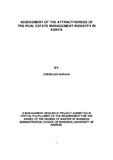| dc.description.abstract | Industry attractiveness is deemed to be one of the two primary determinants of organization profitability, the other one being the organization chosen competitive strategy. Attractive industries are the ones where there is stable and relatively low intensity of competitive rivalry. This is likely to be the case where threat of new entrants to the industry is low, or if product differentiation is such that the capability to sustain extensive marketing and promotional campaigns is critical. Porter also cited lack of substitute products or services and the extent to which the buyers from and suppliers to the producers in an industry enjoy low bargaining power as further indicators of industry attractiveness.
Conversely, industries are unattractive where f rivalry between existing competitors is intense. This intensity will be exacerbated where the threat of new entrants is high or substitute products are or become widely available and buyers or suppliers are able to exert bargaining power over industry producers. Land use planning regulations in Kenya have failed to influence land development patterns in the rapidly growing urban areas. Kenya's experience reveals lack of official government intervention and established procedures in formulating rules for allocation of land, control, approval and regulation of urban development. Evidence in Kenya shows the inability of land use planning regulations to hinder the occurrence of the problems associated with contemporary land use activities.
This study focuses on attractiveness of the real estate management industry in Kenya. Real estate management has recently witnessed an influx of firms into this industry thereby raising questions on what may be the force behind this high entry into this industry. The main objective of this study was to find out the level of attractiveness of this industry as well as determine the factors influencing the attractiveness of firms in this industry. Field study included administering questionnaires to a sample of 45 real estate management firms. Completed questionnaires were then edited for completeness and consistency and then analyzed/interpreted using descriptive statistics.
The research findings established that the real estate management industry in Kenya is less attractive due to: high threat of entry of new competitors, high threat of substitute products and services, high bargaining powers of developers (suppliers), high bargaining power of the buyers and high intensity of rivalry amongst the competing firms which in overall decreases the profit potential for the incumbent firms competing in this industry. | en_US |

